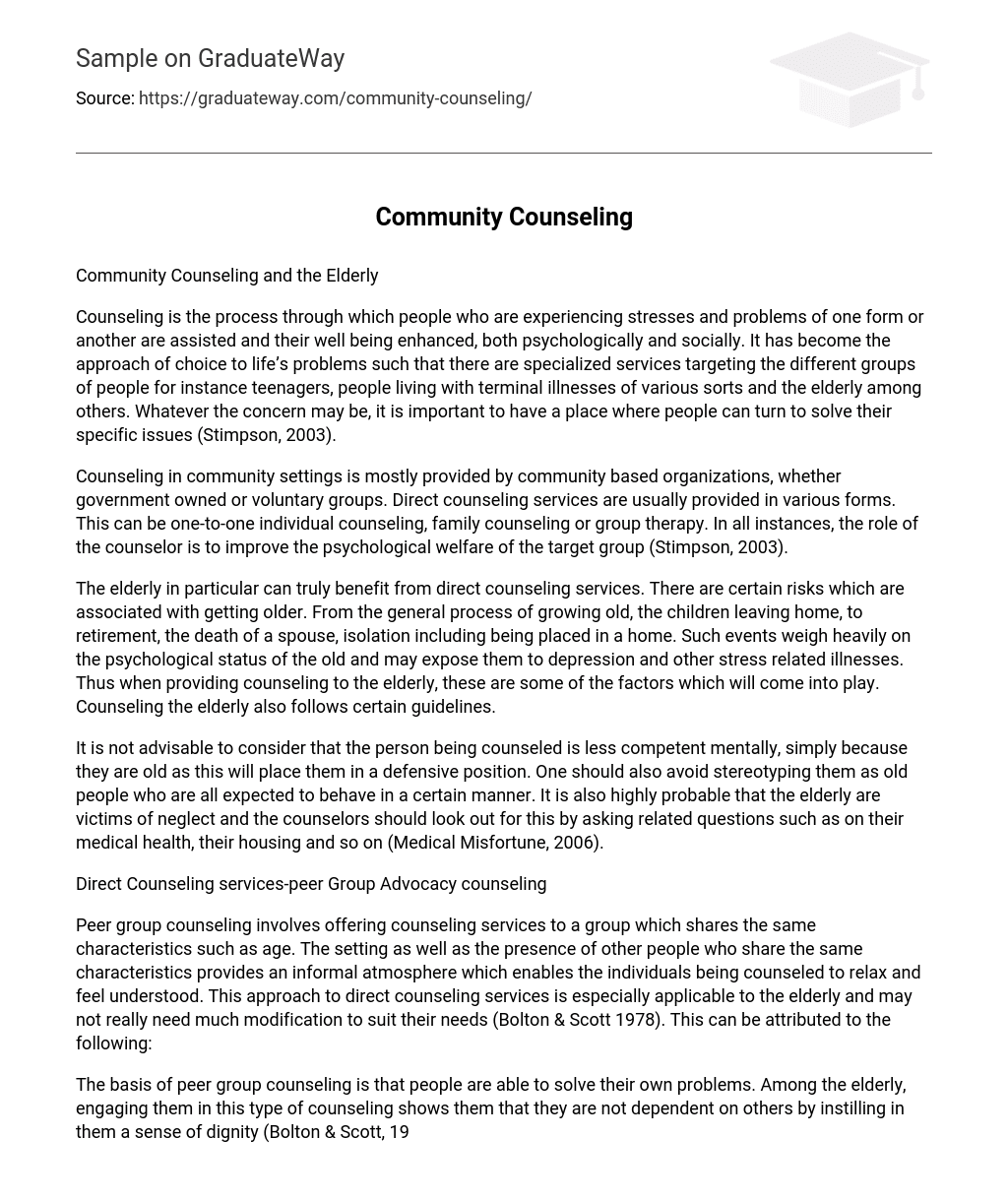Counseling is a process that assists people who are experiencing stresses and problems, enhancing their well-being both psychologically and socially. It has become the preferred approach to life’s problems, with specialized services targeting different groups of people such as teenagers, those living with terminal illnesses, the elderly, among others. Whatever the concern may be, it is essential to have a place where people can turn to solve their specific issues (Stimpson, 2003).
Counseling in community settings is primarily provided by community-based organizations, whether government-owned or voluntary groups. Direct counseling services are typically offered in various forms, including one-to-one individual counseling, family counseling, or group therapy. In all cases, the counselor’s role is to enhance the psychological well-being of the target group (Stimpson, 2003).
The elderly can benefit greatly from direct counseling services. Aging comes with certain risks, such as children leaving home, retirement, the death of a spouse, isolation, and being placed in a home. These events can weigh heavily on the psychological status of older individuals and may expose them to depression and other stress-related illnesses. Therefore, when providing counseling to the elderly, it is important to consider these factors. Counseling for the elderly also follows specific guidelines.
It is not advisable to consider elderly individuals as less mentally competent simply because of their age, as this can put them in a defensive position. Stereotyping them as all behaving in a certain way should also be avoided. Additionally, it is highly probable that the elderly may be victims of neglect, so counselors should inquire about related topics such as their medical health and housing (Medical Misfortune, 2006).
Peer group counseling involves offering counseling services to a group of individuals who share similar characteristics, such as age. The presence of others who share the same characteristics creates an informal atmosphere that allows those being counseled to relax and feel understood. This approach is particularly effective for the elderly and may not require significant modifications to meet their needs (Bolton & Scott, 1978). This is due to the following reasons:
The basis of peer group counseling is that individuals are capable of solving their own problems. Engaging the elderly in this type of counseling demonstrates to them that they are not reliant on others, instilling a sense of dignity (Bolton & Scott, 1978). Peer counseling involves constructive listening and response from the counselor rather than clinical psychotherapeutic responses offered by psychiatrists. This approach provides individuals with a level of sensitivity that allows them to comfortably discuss all normal concerns in their lives (Bolton & Scott, 1978).
The use of paraprofessionals and lay counselors provides a warm atmosphere that is different from the hospital environment of clinical psychologists (Bolton & Scott, 1978). Additionally, using elderly individuals as peer counselors not only offers support to their fellow elderly but also helps them age successfully (Ho, 2007).
References
- Bolton C.R., Scott J.E.D. (1978). Peer-Group Advocacy Counseling for the Elderly: A Conceptual Model. Journal of Gerontological Social Work, 114, 321-330.
- Ho, A. (2007). A Peer Counseling Program for the Elderly with Depression Living in the Community. Aging and Mental Health, 11(6), 69-74. New York: Routledge Publisher.
- Stimpson, Q. (2003). Clinical Counseling in Voluntary and Community Settings. East Sussex: Psychology Press.





